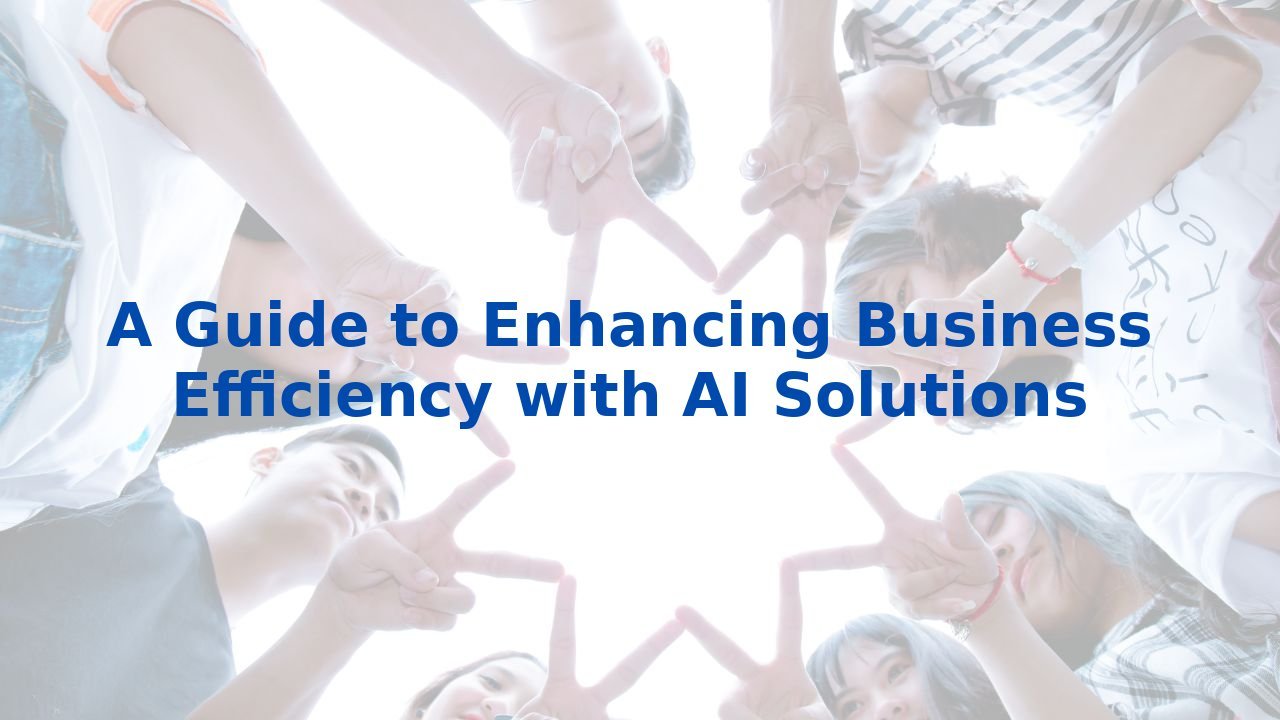A Guide to Enhancing Business Efficiency with AI Solutions
Enhancing Business Efficiency with AI Solutions
In a rapidly changing business landscape, staying ahead means embracing innovation. Artificial Intelligence (AI) isn't just a buzzword; it's a transformative force that is proving to be a game-changer in enhancing business efficiency and driving growth. This guide aims to explore how integrating AI solutions into various organizational processes can lead to substantial improvements in performance and engagement.
1. **Revamping Meetings and Communication**
Meetings often drain time and productivity due to tedious administrative tasks. Enter AI, which has the potential to revolutionize how we manage communication. Automation can handle scheduling, transcribing conversations, and summarizing key points, ensuring that vital information is captured and disseminated effectively. This streamlining not only conserves valuable time but enhances clarity and focus in discussions, paving the way for agile decision-making.
2. **Empowering Sales and Marketing Strategies**
AI analytics can significantly refine sales and marketing efforts. By leveraging data-driven insights, teams can better understand customer behavior and preferences, allowing them to tailor their strategies accordingly. The automation of customer interactions through chatbots and AI-driven CRM systems can lead to more engaged prospects and increased conversion rates. Sales teams can then prioritize high-value tasks, elevating revenue potential and optimizing their effectiveness.
3. **Transforming Customer Service Experiences**
Providing exceptional customer service is increasingly essential for business success, and AI can play a pivotal role in this arena. Automated systems can monitor service calls in real-time, identifying areas for improvement and ensuring that clients receive the highest standard of support. This predictive capability means not only can issues be addressed before they escalate, but it also breeds a culture of continuous improvement, enhancing overall customer satisfaction.
4. **Accelerating Product Development**
The complexities of product development can often delay time-to-market. AI-driven generative design software can revolutionize this process by exploring myriad design alternatives based on pre-defined parameters. This capability eliminates the costly and time-consuming need for physical prototypes, allowing businesses to pivot quickly and bring innovative products to market faster and more efficiently.
5. **Streamlining Content Generation**
Creating content is vital but can be a labor-intensive endeavor. AI can automate content creation, generating high-quality copy at an impressive scale. This not only ensures consistency across communication channels but also frees up creative teams to focus on strategy and narrative development instead of manual copywriting tasks. As a result, organizations can maintain a robust and agile content workflow.
6. **Optimizing Human Resources (HR) Practices**
HR departments are increasingly recognizing the value of AI in streamlining processes from recruitment to employee management. AI can automate initial candidate assessments, making the hiring process far more efficient while enhancing objectivity. Moreover, AI can facilitate salary negotiations by providing data-driven insights into market trends, ensuring that offers remain competitive and fair.
7. **Enhancing Sales Processes**
Sales processes can be cumbersome, often involving repetitive tasks and scattered information. AI can help by automating these mundane chores, like lead scoring and email drafting while enabling dynamic sales journeys tailored to individual customer needs. By focusing on higher-value activities, sales teams can boost their productivity and effectiveness, translating to improved results.
Benefits of AI Integration in Business
The implementation of AI offers numerous advantages that can catalyze enhanced productivity and streamlined operations. Here are a few key benefits:
- Data Analysis: AI excels at sifting through vast datasets, unearthing patterns that humans might overlook. This backdrop of insights facilitates informed decision-making and strategic foresight.
- Process Construction: AI can help construct efficient workflows based on historical data, significantly reducing the lag time traditionally associated with process creation.
- Automation: Routine tasks can be automated, freeing up employee time for innovative and strategic thinking rather than manual execution.
- Real-Time Monitoring: AI allows for continuous oversight, swiftly spotting anomalies or deviations, thus enabling preemptive action to address issues before they burgeon into significant problems.
The Necessity of Training for AI Success
While the potential of AI is vast, it is only as effective as the people utilizing it. Here’s why training is crucial:
- Tool Familiarity: Employees must understand how to use AI tools effectively. Comprehensive training programs ensure they can integrate these technologies into their daily workflows seamlessly.
- Data Skills: The analytics capabilities of AI are only as good as the interpretation that follows. Training programs should equip employees with the skills necessary to make sense of AI-generated data to drive actionable insights.
- Adaptability: The fast-paced nature of AI development necessitates a culture of continuous learning. Regular training keeps employees ahead of the curve, priming them to adapt alongside technology’s evolution.
Conclusion
AI represents a paradigm shift in how organizations can enhance their efficiency and overall effectiveness across processes. From improving meetings to refining product development, AI tools open doors to unparalleled opportunities for innovation. However, the journey does not end with technology adoption; investing in training is vital to unleash the full potential of AI, fostering an environment where efficient practices thrive. Embracing AI holistically will pave the way for a more agile, productive, and competitive business landscape.



